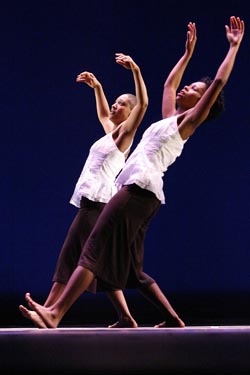|
“I studied modern and jazz, but I’d never been exposed to traditional African dance … Then I met Pearl Primus,” she said. “That experience opened the door for me, and I realized that I wanted to develop a consistent vocabulary that included elements of African dance.”
While visiting Africa to study the cultural dances of several different countries, Welsh began to develop Umfundalai, a pan-African dance technique that combines elements of traditional African dance with African-American dance forms.
Through Umfundalai, students learn a language of body movement that challenges them to dance from the inside out. Unlike other modern forms where specific body types are preferred, Welsh’s technique draws from the power of the body regardless of age, size or race.
Affectionately called “Mama Kariamu” by students and members of her dance company, she admits that learning to become totally immersed in the process of dance can be difficult. However, she often finds that that the most rewarding part of teaching dance is watching her students’ talent emerge.
“It’s about spirit and dancing from your heart,” she said. “It’s amazing to me: I’ll meet a student who thinks that they are not a dancer — and then they will do something so beautiful, so elegant that it harkens back to the ancient and in that moment, I am inspired to add it to my technique.”
Dina-Verly Sabb-Mills practically grew up in Welsh’s dance studio. Sabb-Mills remembers accompanying her mother to Welsh’s company rehearsals.
“I dreaded going to the studio; I remember sulking in the corner with my Fruit Roll-Up watching my mother,” Sabb-Mills recalls.
More than 10 years later, the 24-year-old graduate student in the Boyer College of Music and Dance is dancing in her mother’s shoes. As a mother and a principal dancer in Welsh’s company, she is now adamant about her plans to expose her children to African and African-American performance art.
“Umfundalai definitely helped me develop,” she said. “I’ve been with Kariamu and Company for 10 seasons, and I am very much invested in it. For me, Umfundalai isn’t just a set of movements. It’s a way of life and a means of staying connected to my culture.”
Thursday, Feb.14 through Saturday, Feb.16 at 8 p.m.
Conwell Dance Theater
Tickets: $15 general admission/$13 students and senior citizens/ Free for Temple students with OWLcard
|
